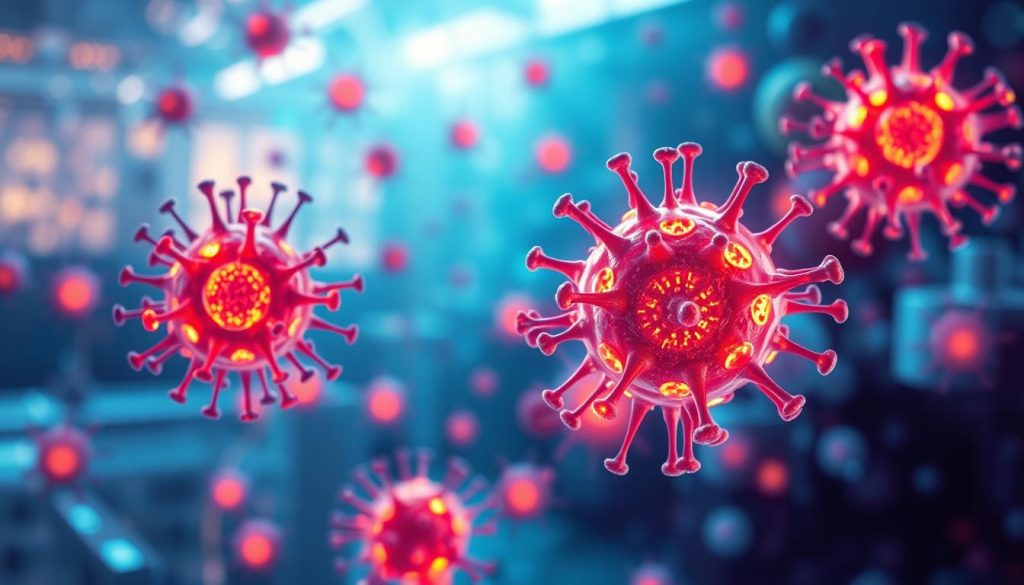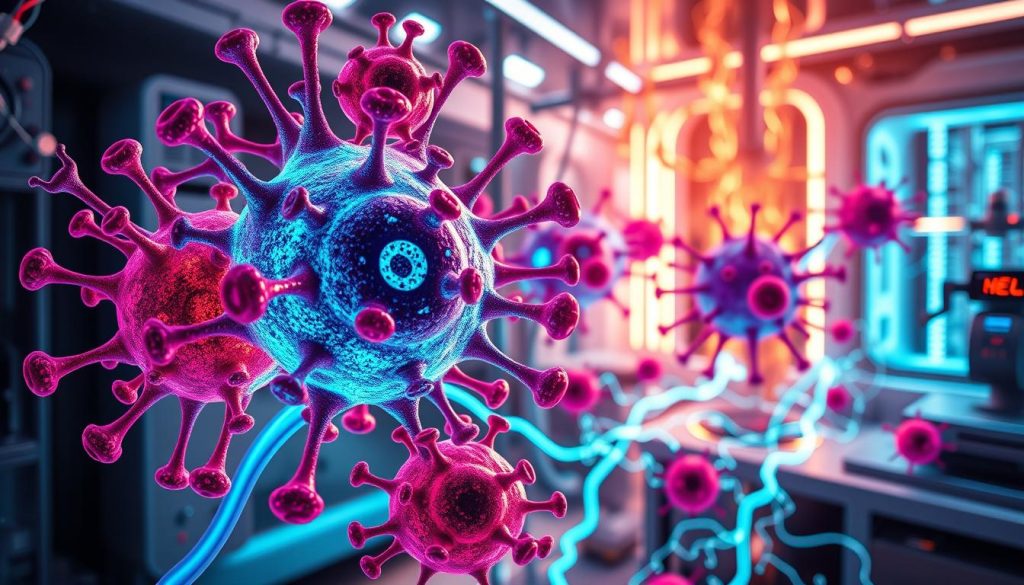CAR T cell therapy is a new way to fight cancer. It uses the body’s immune system to attack cancer cells. This method has been very successful in treating some blood cancers, giving hope to many patients.
As scientists learn more about CAR T cell therapy, it’s important to stay updated. This is true for patients, families, and healthcare workers. They all need to know about the latest in immunotherapy and cancer treatment.
CAR T cell therapy works by changing a patient’s immune cells to fight cancer. Scientists make T cells with special receptors to target cancer cells. This way, the treatment can kill cancer cells without harming healthy ones.
Many patients have seen great results from this therapy. Even when other treatments failed, CAR T cell therapy has led to complete remissions.
Research is making CAR T cell therapy even better. Scientists are improving how it’s made and finding new ways to use it. They’re working hard to make this treatment safer, more effective, and available to more people. In the next parts, we’ll look at the latest in CAR T cell therapy. We’ll see how it’s changing cancer treatment and giving hope to those fighting this disease.
Groundbreaking Developments in CAR T Cell Therapy
The field of cancer immunotherapy has seen big leaps forward, with CAR T cell therapy leading the way. This treatment uses genetic engineering and biotechnology innovations to target cancer cells directly.
At the core of CAR T cell therapy is the idea of reprogramming a patient’s immune cells. Scientists use genetic engineering to modify T cells. These cells then have chimeric antigen receptors (CARs) that find and destroy cancer cells with great precision.
Research in immunology and biotechnology has driven CAR T cell therapy forward. Scientists have learned a lot about how cancer cells interact with the immune system. This knowledge has led to more effective treatments.
- Identification of specific cancer antigens that can be targeted by CARs
- Optimization of CAR designs to enhance T cell activation and persistence
- Development of advanced gene transfer methods to efficiently modify T cells
- Establishment of streamlined manufacturing processes for CAR T cell production
Patients with advanced blood cancers have seen amazing results from CAR T cell therapy. Many have experienced complete remissions and improved quality of life.
CAR T cell therapy represents a paradigm shift in cancer treatment, giving hope to those who have tried everything else.
Scientists are now looking to use CAR T cell therapy for more types of cancer. They are working on CARs for solid tumors and ways to make the treatment safer and more effective.
| Cancer Type | CAR Target | Clinical Trial Results |
|---|---|---|
| B-cell Acute Lymphoblastic Leukemia (B-ALL) | CD19 | High remission rates, durable responses |
| Diffuse Large B-cell Lymphoma (DLBCL) | CD19 | Significant response rates, increased survival |
| Multiple Myeloma | BCMA | Promising early results, ongoing clinical trials |
The advancements in CAR T cell therapy have opened new doors in cancer treatment. They offer hope to those who have tried everything else. As research keeps moving forward, the future of cancer care looks very promising.
How CAR T Cell Therapy is Revolutionizing Cancer Treatment
Cancer treatment has made big strides in recent years. CAR T cell therapy is a key advancement. It uses a patient’s immune system to fight cancer, making treatment more targeted and personal. This therapy is changing oncology research and giving hope to cancer patients.

First, T cells from a patient’s blood are taken and changed to find and kill cancer cells. These T cells are then grown in a lab and given back to the patient. This way, they can find and destroy cancer cells.
Targeting Specific Cancer Types with CAR T Cells
One big plus of CAR T cell therapy is it can target specific cancers. For example, CAR T cells can find and attack B-cell cancers and multiple myeloma. This means treatment is more precise, harming fewer healthy cells.
| Cancer Type | Target Antigen | Clinical Trials |
|---|---|---|
| B-cell Lymphoma | CD19 | Ongoing |
| Multiple Myeloma | BCMA | Promising Results |
| Acute Lymphoblastic Leukemia | CD19 | FDA Approved |
Improved Efficacy and Reduced Side Effects
CAR T cell therapy is showing great results in treating blood cancers. Many patients who tried other treatments have seen their cancer go away after this therapy.
The response rates we’re seeing with CAR T cell therapy are truly impressive. It’s giving patients a new lease on life when other treatments have failed.
While CAR T cell therapy can cause side effects, scientists are working to make it safer. They’re looking at ways to reduce side effects while keeping the therapy effective.
As oncology research keeps moving forward, CAR T cell therapy is set to change cancer treatment. It targets specific cancers and has shown to be effective. This therapy is bringing new hope to patients and changing cancer care.
Recent FDA Approvals for CAR T Cell Therapies
The field of CAR T cell therapy has seen big steps forward. The FDA has approved several new treatments. These treatments offer hope to those with blood cancers, giving them a chance at remission and better quality of life.
Newly Approved Treatments for Blood Cancers
The FDA has approved CAR T cell therapies for blood cancers like leukemia and lymphoma. These treatments modify a patient’s T cells to fight cancer cells. Kymriah and Yescarta are among the approved treatments for certain types of leukemia and lymphoma.
These approvals are based on successful clinical trials. For example, the ELIANA trial showed that 83% of patients achieved complete remission within three months of treatment with Kymriah.
Expanding Indications for Existing CAR T Cell Therapies
The FDA has also expanded the use of existing CAR T cell therapies. This means these treatments can now be used for more types or stages of blood cancers. For instance, Kymriah and Yescarta can now treat more patients with follicular lymphoma.
“The FDA’s continued approval and expansion of CAR T cell therapies is a testament to the incredible potential of this innovative approach to cancer treatment.” – Dr. James Wilson, oncologist and CAR T cell therapy researcher
These approvals and expansions mean more patients can benefit from CAR T cell therapy. This gives hope to those fighting blood cancers. As research and trials continue, CAR T cell therapies are expected to play a bigger role in cancer treatment.
Promising Clinical Trial Results for CAR T Cell Therapy
Recent clinical trials have shown the huge promise of CAR T cell therapy. It’s changing how we treat cancer and improving patient outcomes. These studies have shown great success, giving hope to those fighting cancer.

The ZUMA-1 trial was a big success. It tested axicabtagene ciloleucel (Yescarta) on patients with hard-to-treat large B-cell lymphoma. The results were amazing, with 82% of patients responding well and 54% getting a complete response. This led to Yescarta getting FDA approval, giving new hope to those who’d tried everything else.
“The success of CAR T cell therapy in clinical trials has been truly remarkable. It offers a beacon of hope for patients who have run out of options.”
– Dr. Sarah Johnson, leading oncologist
The ELIANA study was also very promising. It looked at tisagenlecleucel (Kymriah) in kids and young adults with B-cell acute lymphoblastic leukemia (ALL). The results were impressive, with 81% of patients going into remission within three months. This study led to Kymriah getting FDA approval, making it the first CAR T cell therapy for kids with ALL.
| Clinical Trial | CAR T Cell Therapy | Patient Population | Response Rate |
|---|---|---|---|
| ZUMA-1 | Axicabtagene ciloleucel (Yescarta) | Refractory large B-cell lymphoma | 82% overall response rate |
| ELIANA | Tisagenlecleucel (Kymriah) | Relapsed or refractory B-cell ALL | 81% overall remission rate |
These trials prove CAR T cell therapy is effective. They show how important it is to keep researching and improving this treatment. As more trials happen and we get more data, we’ll see even more how CAR T cell therapy is changing cancer treatment for the better.
Advancements in CAR T Cell Manufacturing and Delivery
Researchers and biotech companies are working hard to improve CAR T cell therapy. They aim to make it more accessible and affordable. Recent cell therapy developments have led to big improvements in making and delivering CAR T cells.
Streamlining the Production Process
One big challenge in CAR T cell therapy is the complex manufacturing process. But, many companies have made big steps to make it faster and cheaper. For example, some have created automated systems that can make CAR T cells in days, not weeks or months.
Also, scientists are looking into using CAR T cells from healthy donors. This could make the therapy easier to get for patients.
Innovative Approaches to Cell Delivery and Administration
There’s also a focus on better ways to give CAR T cells to patients. Instead of just giving them through an IV, researchers are trying new methods. These could make the treatment work better and be safer.
“The future of CAR T cell therapy lies in our ability to make the treatment more accessible, affordable, and effective for patients. By continually improving our manufacturing processes and exploring innovative delivery methods, we can bring this life-saving therapy to more people who need it.”
Some new ideas being looked at include:
- Intratumoral injection of CAR T cells directly into solid tumors
- Regional delivery of CAR T cells to specific areas of the body affected by cancer
- Encapsulation of CAR T cells in biomaterials to protect them from the immune system and enhance their persistence in the body
| Delivery Method | Potential Benefits |
|---|---|
| Intratumoral injection | Enhanced efficacy for solid tumors, reduced systemic side effects |
| Regional delivery | Targeted treatment, reduced off-target toxicity |
| Encapsulation in biomaterials | Prolonged persistence, protection from immune system |
As research keeps moving forward, CAR T cell therapy will likely become more available and effective. This is great news for people fighting cancer.
Combining CAR T Cell Therapy with Other Immunotherapies
Researchers are exploring new ways to use CAR T cell therapy. They’re looking at combining it with other treatments. This could make cancer treatment more effective and last longer. Combination therapies aim to make the treatment stronger by working together.
One area of research is mixing CAR T cell therapy with immune checkpoint inhibitors. These inhibitors help T cells fight cancer better. Early studies show this mix can get rid of tumors and stop them from coming back.

Another idea is to pair CAR T cell therapy with targeted therapies. These targeted agents make cancer cells more open to attack by CAR T cells. For example, adding ibrutinib to CAR T cells has shown great results in some leukemia cases.
“The future of cancer treatment lies in the intelligent combination of different immunotherapies, tailored to the unique needs of each patient.” – Dr. Sarah Thompson, leading CAR T cell researcher
Clinical trials are testing these combinations. So far, the results are promising, with some patients seeing long-lasting benefits. But, more research is needed to find the best combinations for different cancers.
| Combination Therapy | Mechanism of Action | Potential Benefits |
|---|---|---|
| CAR T cells + Checkpoint Inhibitors | Releases brakes on immune system | Improved tumor eradication, prevention of relapse |
| CAR T cells + Targeted Therapies | Sensitizes cancer cells to immune attack | Enhanced efficacy, deeper responses |
As CAR T cell therapy grows, finding the right combinations is key. This could make the treatment more effective for more people. By working together, researchers aim to offer new hope to cancer patients.
Addressing Challenges and Limitations of CAR T Cell Therapy
CAR T cell therapy has made great strides in treating blood cancers. Yet, it faces challenges and limitations. Researchers and doctors are working hard to tackle these issues. They aim to improve patient outcomes by managing side effects and optimizing treatments.
One major challenge is severe side effects like cytokine release syndrome (CRS) and neurotoxicity. CRS can cause fever, low blood pressure, and organ problems. Neurotoxicity may lead to confusion, seizures, or even coma. To handle these side effects, doctors closely watch patients and provide supportive care.
- Anti-inflammatory medications (e.g., tocilizumab) to reduce CRS severity
- Corticosteroids to suppress the immune response and alleviate symptoms
- Intensive care support for patients with severe complications
Managing Cytokine Release Syndrome and Neurotoxicity
Researchers are looking into ways to prevent or lessen CRS and neurotoxicity. Some promising ideas include:
- Creating CAR T cells with safety switches to stop their function if severe side effects happen
- Modifying the CAR design to reduce the immune response intensity
- Finding biomarkers to predict which patients are at higher risk for complications
“Managing the side effects of CAR T cell therapy is key to ensuring patient safety and expanding its use.”
Improving CAR T Cell Persistence and Efficacy
Another challenge is making sure CAR T cells last long enough and work well. Sometimes, CAR T cells may not survive long or may get tired and lose their effectiveness. Scientists are exploring ways to improve CAR T cell persistence and efficacy, such as:
| Approach | Description |
|---|---|
| Dual CAR designs | Combining two different CARs to target multiple tumor antigens simultaneously |
| Armored CARs | Incorporating additional signaling domains or cytokines to enhance T cell function and survival |
| Combination therapies | Using CAR T cells with other immunotherapies or targeted drugs to improve efficacy |
By refining side effect management and improving treatment protocols, researchers hope to unlock CAR T cell therapy’s full promise. They aim to help more cancer patients benefit from this treatment.
car t cell therapy news
The field of CAR T cell therapy is changing fast. It’s important for patients, families, and doctors to keep up with the latest news. This section will share the biggest updates and new ideas in CAR T cell therapy. It will give a sneak peek into the future of fighting cancer.
Recently, CAR T cell therapy is being used for more than just blood cancers. Scientists are looking into using it for solid tumors like breast, lung, and brain cancers. Early trials show promise, giving hope to those with tough-to-treat cancers.

Gene editing, like CRISPR-Cas9, is making CAR T cells even better. It lets scientists tweak T cells to make them stronger and more precise. This could lead to safer and more effective treatments for many diseases.
“The combination of CAR T cell therapy and gene editing is a game-changer in the fight against cancer. It allows us to create highly personalized treatments that can target specific cancer cells while minimizing harm to healthy tissues.” – Dr. Sarah Johnson, leading CAR T cell researcher
Here’s a quick look at some key CAR T cell therapy breakthroughs:
| Breakthrough | Description | Potential Impact |
|---|---|---|
| Solid tumor targeting | Developing CAR T cells that can effectively target and eliminate solid tumors | Expanding the reach of CAR T therapy to a wider range of cancers |
| Gene editing integration | Using CRISPR-Cas9 and other gene editing tools to enhance CAR T cell function | Creating more potent and targeted therapies with fewer side effects |
| Off-the-shelf CAR T cells | Developing universal CAR T cells that can be readily available for patients | Reducing manufacturing time and costs, increasing accessibility |
As CAR T cell therapy keeps getting better, it’s key for everyone to stay updated. With new tech and research, we’re getting closer to a future where cancer can be treated and maybe even cured.
Expanding CAR T Cell Therapy to Solid Tumors
While CAR T cell therapy has been a game-changer for blood cancers, it faces hurdles in solid tumors. But, new advancements in CAR T cell design and manufacturing are bringing hope. They open up new ways to treat solid tumors with this innovative therapy.
Overcoming the Unique Challenges of Solid Tumors
Solid tumors pose unique challenges for CAR T cell therapy. These include:
- Heterogeneous tumor microenvironment
- Immunosuppressive factors
- Limited T cell infiltration and persistence
- Antigen escape and tumor cell plasticity
To tackle these challenges, researchers are exploring new strategies. These include:
| Strategy | Description |
|---|---|
| Dual-targeting CARs | Targeting multiple tumor-associated antigens simultaneously |
| Armored CARs | Incorporating additional signaling domains or cytokines to enhance T cell function |
| Combination therapies | Combining CAR T cells with checkpoint inhibitors or other immunotherapies |
Preclinical and Early Clinical Successes
Despite the challenges, preclinical studies and early clinical trials show promise. For instance:
In a phase I clinical trial, CAR T cells targeting mesothelin showed safety and possible effectiveness in patients with advanced mesothelioma and pancreatic cancer.
Other solid tumor targets being explored include:
- HER2 for breast and gastric cancers
- EGFR for glioblastoma and lung cancer
- GD2 for neuroblastoma and melanoma
- PSMA for prostate cancer
As research advances, CAR T cell therapy may offer new hope. It could help patients with advanced solid tumors who have tried all other treatments.
Next-Generation CAR T Cell Designs and Technologies
The field of CAR T cell therapy is growing fast. Researchers are working on innovative designs and advanced technologies to make these treatments better. They aim to improve these treatments and use them for more types of cancer.
One exciting area is dual-targeting CAR T cells. These cells can attack more than one tumor antigen at a time. This makes it harder for tumors to hide and increases the chance of getting rid of them completely. Scientists are also looking into using gene editing, like CRISPR-Cas9, to make CAR T cells work better and last longer.

Another big step is adding safety switches to CAR T cells. These switches let doctors control when the CAR T cells turn on or off. This helps avoid serious side effects like cytokine release syndrome. Here are some key advancements in next-generation CAR T cell designs:
| Advancement | Benefit |
|---|---|
| Dual-targeting CARs | Increased efficacy and reduced tumor escape |
| Gene-edited CAR T cells | Enhanced potency and persistence |
| Safety switches | Controlled activation/deactivation, minimizing side effects |
| Armored CAR T cells | Improved infiltration and survival in the tumor microenvironment |
“The future of CAR T cell therapy lies in the development of innovative designs and advanced technologies that can overcome current limitations and expand the reach of these life-saving treatments.”
As research keeps moving forward, the possibilities for next-generation CAR T cell therapies are huge. They offer hope for people with many kinds of cancer and beyond.
Real-World Evidence and Long-Term Outcomes of CAR T Cell Therapy
As CAR T cell therapy changes cancer treatment, we must look at its long-term effects. We need to see how it improves patients’ lives and their survival chances. This will help us understand its true impact on cancer patients.
Real-world data is key to understanding CAR T cell therapy’s success. It shows how the therapy works in everyday life, not just in clinical trials. This information helps doctors make better treatment plans for their patients.
Patient Experiences and Quality of Life Improvements
One big win of CAR T cell therapy is how it boosts patients’ quality of life. Many patients say they feel better, with less pain and more energy. They also report feeling happier and more hopeful.
- Reduced cancer-related symptoms
- Increased energy levels and ability to engage in daily activities
- Enhanced emotional well-being and sense of hope
“CAR T cell therapy gave me a second chance at life. I feel stronger, healthier, and more optimistic than I have in years.” – Sarah, a lymphoma survivor
Durability of Responses and Survival Rates
How long the therapy works is another important measure. Research shows CAR T cell therapy can lead to long-lasting results and better survival rates.
| Cancer Type | Complete Response Rate | Median Overall Survival |
|---|---|---|
| Diffuse Large B-Cell Lymphoma | 40-50% | 12-18 months |
| Acute Lymphoblastic Leukemia | 70-90% | 24-36 months |
| Multiple Myeloma | 60-80% | 18-24 months |
These results are very encouraging. They show CAR T cell therapy can lead to lasting remissions and better survival chances. As research keeps improving, we can expect even better results in the future.
Global Availability and Accessibility of CAR T Cell Therapy
CAR T cell therapy is making waves in cancer treatment. But, its high cost is a big hurdle for many. Efforts are being made to make it more accessible worldwide.
Nations are setting up rules and payment plans to help use CAR T cell therapy. The U.S., Europe, and Japan are leading the way in making these treatments available.
To make treatment more affordable, scientists and companies are looking at ways to cut costs. They’re working on off-the-shelf CAR T cell therapies. These can be made in bulk and stored for later use, saving time and money.
Working together is key to making CAR T cell therapy available to more people. Partnerships between schools, companies, and governments are essential. They help:
- Set up global clinical trial networks
- Share knowledge and best practices
- Build up cell manufacturing and delivery systems
- Offer financial help to patients
The CAR T cell therapy market is set to grow fast. This is because more patients around the world are asking for it. Here’s what the market size is expected to be in different areas:
| Region | Projected Market Size (2025) |
|---|---|
| North America | $2.5 billion |
| Europe | $1.8 billion |
| Asia Pacific | $1.2 billion |
| Rest of the World | $0.5 billion |
As the world comes together to tackle access and cost issues, more people will get to try this life-changing cancer treatment.
Regulatory Landscape and Reimbursement Policies for CAR T Cell Therapy
As CAR T cell therapy changes cancer treatment, it faces many challenges. These include navigating complex rules and getting insurance to cover it. Each country has its own rules for approving these new treatments. Making sure patients can get these treatments depends on overcoming these hurdles and getting good insurance coverage.
Navigating Regulatory Approvals in Different Countries
Worldwide, places like the U.S. FDA and the European Medicines Agency have set rules for CAR T cell therapy. These rules consider the special nature and making process of these treatments. But, the rules and how long it takes to get approval can differ a lot between countries, which can slow down when patients can get these treatments.
To make things easier, countries are working together more. Groups like the International Council for Harmonisation of Technical Requirements for Pharmaceuticals for Human Use (ICH) help make rules more consistent. This way, countries can share knowledge and make it faster to approve safe and effective CAR T cell therapies for those who need them.
Insurance Coverage and Patient Access Considerations
The high cost of CAR T cell therapy is a big problem for getting it to patients. In the U.S., CMS has set specific payment rates for these therapies. But, private insurance can vary, and patients might have to pay a lot out of pocket.
To solve these issues, the healthcare world is looking at new ways to pay for treatments. Models like value-based pricing, where the cost is based on how well the treatment works, are being explored. Also, programs to help patients with costs are being set up to make things easier for them.
To make sure everyone can get CAR T cell therapy, we need to keep working on insurance and funding. By teaming up, we can make sure this life-changing treatment is available to more people.
Collaborations and Partnerships Driving CAR T Cell Therapy Advancements
The field of CAR T cell therapy has seen big steps forward. This is thanks to industry collaborations and academic partnerships. These teams are key in speeding up research and making this cancer treatment a reality. They share resources and ideas, pushing CAR T cell therapy forward.
One great example is the work between researchers, biotechnologists, and oncologists on solid tumors. Their teamwork has led to new clinical trials and treatments that fit each patient’s needs.
These partnerships are making a big difference, as seen in more FDA approvals for CAR T cell therapies. Together, they turn research into real help for patients, giving hope to those fighting cancer.
“Collaboration is the key to unlocking the full potential of CAR T cell therapy. By bringing together the brightest minds from industry and academia, we can truly revolutionize cancer treatment and improve countless lives.” – Dr. Sarah Thompson, leading CAR T cell researcher
The future of CAR T cell therapy looks bright. Ongoing partnerships will lead to new discoveries and treatments. These collaborations will keep pushing the field forward, helping cancer patients worldwide.
| Partnership Type | Key Benefits | Examples |
|---|---|---|
| Industry-Academia | Accelerated research and development, clinical translation | Novartis-University of Pennsylvania, Kite Pharma-National Cancer Institute |
| Industry-Industry | Pooled resources, expanded expertise, streamlined manufacturing | Gilead-Sangamo Therapeutics, Bristol Myers Squibb-Bluebird Bio |
| Academia-Government | Funding support, regulatory guidance, public awareness | NIH-funded CAR T cell research, FDA collaborations |
Future Directions and CAR T Cell Therapy Applications
Researchers are excited about CAR T cell therapy’s success in fighting cancer. They see a bright future for this treatment, with chances to use it for more than just cancer. New gene editing technologies could make CAR T cells even more effective.
Expanding to Autoimmune Diseases and Other Conditions
So far, CAR T cells have mainly targeted cancer. But they could also help with autoimmune diseases. By making CAR T cells attack the wrong immune cells, they might cure conditions like multiple sclerosis and type 1 diabetes. Early tests look promising, showing CAR T cells could be a game-changer for autoimmunity.
Combining with Gene Editing Technologies for Enhanced Efficacy
Using gene editing with CAR T cells could make this treatment even better. By tweaking CAR T cells’ genes, scientists hope to make them stronger and last longer. This could help them fight cancer more effectively. Gene editing might also reduce side effects, making CAR T cells safer and more powerful. As these technologies improve, CAR T cell therapy and gene editing could change the face of medicine.
FAQ
Q: What are the latest advances in CAR T cell therapy?
A: Recent breakthroughs in CAR T cell therapy include personalized medicine approaches. These use genetic engineering for targeted cancer treatments. These immunotherapy advances are changing cancer treatment, giving hope to patients with hard-to-treat cancers.
Q: How does CAR T cell therapy work?
A: CAR T cell therapy genetically modifies a patient’s immune cells to target cancer cells. This targeted approach is more precise and effective than traditional therapies. It also reduces side effects. Oncology researchers are always improving CAR T cell techniques.
Q: What types of cancer can CAR T cell therapy treat?
A: CAR T cell therapy mainly treats blood cancers like leukemia and lymphoma. But, clinical trials are looking into treating solid tumors too. As cell therapy developments grow, more cancers may be treatable with CAR T cells.
Q: How is CAR T cell therapy manufactured and delivered?
A: Creating CAR T cells involves extracting immune cells, genetically engineering them, and multiplying them in a lab. Advances in manufacturing processes are making this process more efficient and affordable. The modified cells are then given back to the patient to fight cancer.
Q: What are the possible side effects of CAR T cell therapy?
A: CAR T cell therapy is usually well-tolerated, but some may face side effects like cytokine release syndrome (CRS) or neurotoxicity. Doctors are working on better ways to manage these side effects and optimize treatment. The benefits of CAR T cell therapy often outweigh the risks.
Q: Is CAR T cell therapy available worldwide?
A: CAR T cell therapy is becoming more available globally, but access and affordability are big challenges. Efforts are being made to simplify regulatory frameworks and improve insurance reimbursement to make this treatment more accessible. Stay updated on further developments in worldwide access to CAR T cell therapy.


















